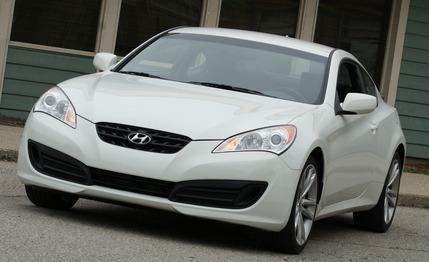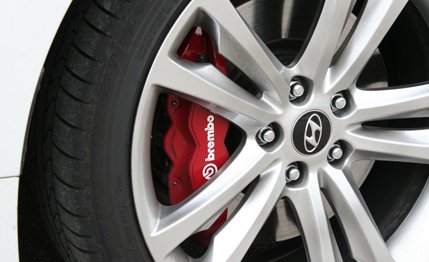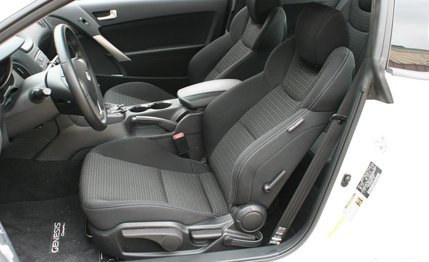 Short Take Road Test
Short Take Road Test

Hyundai released its Genesis coupe a little late to capitalize on the prerecession Fast and Furious era, but the company’s factory-backed pro drift car, myriad SEMA customs, and tire-shredding TV commercials show that the Korean company understands the power of the aftermarket among consumers of affordable, sporty cars. Nowhere is this more evident than with the Genesis coupe 2.0T model, which starts at $22,750 and packs a turbocharged 210-hp, 2.0-liter four-cylinder.
We’ve covered the Genesis coupe several times before and have found it to be a fun package, if a little rough around the edges. A V-6 Track model lost out to the Chevrolet Camaro V-6 in a two-way comparison test, but the two-door Genesis represents a bold step for a carmaker not known for sports cars or zesty styling. Hyundai is hoping this 2.0T R-Spec—it essentially offers all the Track model’s performance goodies—will further the car’s appeal with those who can’t leave well enough alone.
Our Kind of Stripper
The R-Spec gives buyers looking to modify and customize a solid-performing platform to start—a turbo-four engine, four-wheel Brembo brakes, a firmer suspension, a limited-slip differential, and 19-inch wheels shod with summer Bridgestones—but strips away the expensive trinkets that likely would be replaced via the aftermarket. Although some conveniences are present, such as projector headlights, power locks and windows, and USB/iPod/aux inputs for the standard audio system, the R-Spec is indeed sparse, with manual cloth seats, a navigationless head unit, and a spoilerless tail. There are no options beyond small bits such as the carpeted floor mats ($95) and iPod cable ($30) fitted to our example, which raised the as-tested price to $24,625.


Even if you aren’t swayed by the tuner mentality and the desire to raid the nearest Pep Boys catalog, the R-Spec is a handsome ride (particularly in our tester’s Karussell White) that offers decent rear-wheel-drive performance for less than $25,000. Similar to our previous test of a preproduction 2.0T, the 3327-pound R-Spec with its six-speed manual transmission (there is no automatic R-Spec) hits 60 mph from rest in 6.8 seconds, eclipses the quarter-mile in 15.2 at 93 mph, and tops out at 144 mph. It can cling to the skidpad with 0.89 g of grip, and stopping prowess from 70 mph, at 162 feet, also is very respectable. The R-Spec is rated by the EPA at 21 mpg in the city and 30 mpg on the highway. We managed 22 overall.
Show Me the Boost
The problems with the R-Spec start with the Genesis coupe itself, which, as more than one C/D staffer noted, could use some more time in the oven. Although the car’s primary controls are well positioned and the steering offers decent feedback, hustling the car beyond a commuting pace reveals the notchy and imprecise nature of the gearbox. The ride is rather poor; the chassis feels willing and stiff overall, but the springs and the shocks never appear to know what each other is doing, making for noticeable body movement and harsh, crashing impacts over most bumps. Then there’s the underpowered 2.0T. We’ve experienced firsthand turbo tuners that sabotage a car’s drivability in the quest for more boost, but until Hyundai decides to offer the 2011 Sonata sedan’s optional 274-hp, direct-injected turbo-four in the Genesis coupe, an outside supplier is the only way to get the extra oomph the coupe’s chassis can handle (stepping up to the V-6 notwithstanding). The current engine’s 223 lb-ft of torque at 2000 rpm make for good low-speed drivability and the car is very controllable if you manage to get it a little sideways, but with only 210 hp on tap, the throttle has a limited say in the car’s behavior. What’s more, the 2.0-liter engine—the foundation of which Hyundai developed in an alliance with Mitsubishi and Chrysler—sounds coarse and droning at all speeds, delivering precisely zero invigorating noises of the type that make driving a good performance car special and fun.

All this is magnified when the Genesis coupe’s competitors are taken into account, some of which have considerably stepped up their game of late. A Camaro V-6 (as noted, it already bested the 3.8-liter V-6–powered Genesis coupe Track model) starts at $23,530 and now offers 312 hp from its 3.6-liter mill. And the Ford Mustang V-6 starts at $22,995; it beat the V-6 Camaro in a comparo and was fortified for 2011 with a rowdy 305-hp, 3.7-liter V-6 and an optional performance package. Both of these American competitors handily outpace the R-Spec in a straight line, and the Mustang is far more enjoyable to pilot. (We have yet to sample a base 2011 Mustang without the sport suspension and sticky 19-inch Pirelli rubber, but it’s still more than a second quicker to 60 mph and through the quarter and sounds great while doing so.) The Mustang V-6’s performance package might add a couple grand to the sticker, but you’d have to spend at least that much on the R-Spec to get similar levels of grip, and you’d still be seeing the Ford’s taillights in a drag race.
If You Must
The Genesis coupe as a whole has yet to realize its full potential, and given the R-Spec’s spartan interior and somewhat uncomfortable seats, we have difficulty recommending it as anything other than a blank canvas. True, the R-Spec is a way to address the shortcomings the Genesis coupe’s development engineers haven’t yet tackled, and it remains an option for those who have a disdain for the domestic alternatives. But if avoiding U.S. makes is your mark, you should consider the Subaru Impreza WRX, which starts at $25,690 and is supported by its own army of aftermarket wizards. It may be less sexy with its four or five doors, but the WRX packs a 265-hp wallop from its turbocharged 2.5-liter flat-four, and it has similar or better all-around performance that can be exploited more frequently because of standard all-wheel drive. Ultimately, until Hyundai itself fastifies and furiouses the Genesis coupe—and we expect it will soon enough—better options exist for your 25 grand.